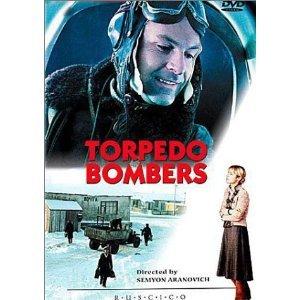“We”ll fix you up with a parachute.”
The marvellous 1983 Soviet film, Torpedo Bombers (Torpedonostsy), from director Semyon Aronovitch is a homage to the Soviet pilots and crews who lost their lives during WWII in their fight against Germany. For the film’s intense look at the lives of these men, Torpedo Bombers is a unique film, and the cinematography of shots of the men in their planes is simply incredible. Brilliant, stunning shots depict the planes’ navigators in close quarters; other shots depict planes in flames–one in a kamikaze dive in a last-ditch effort to destroy the enemy. Other close-ups show faces inside smoking planes, and then shots of a plane disintegrating and falling from the sky. The Soviet planes must fly in close to drop their torpedos, so these missions tend to have a suicidal edge. This incredible film is based on the stories of Yuri German.
It’s 1944, and the film opens with the report of a “fascist convoy” in the area, so crews scrambles, planes are prepared and then take to the skies. Some shots give us an idea of the rudimentary nature of life on the base, and many of the pilots and crews have their families there with them. There’s a downside to this which becomes evident as the film continues.
Torpedo Bombers throws us right into the action, so the story can be a bit disorienting at first until you get your bearings. Many characters are introduced summarily through barked out orders, or called out greetings, and it’s not initially easy to place just who’s who. The relationships between the ranks seems casual and friendly. There’s the sense that life on the base wouldn’t be bad at all–if it weren’t for the threat of imminent death. As one man says, “Life could be so simple, so pleasant. War is so ugly.”
While the plot explores aspects of the lives of a handful of characters, the main story revolves around Sasha Belobrov (Rodion Nahapetov) who’s just returned from 3 months leave after being injured. He returns back to the remote Northern base to discover that the woman he loved has married another man. Another sub-plot concerns Sgt Cherepets (Aleksei Zharkov), a man who falls in love with a kitchen worker named Maroussia (Tatyana Kravchenko) but is uncertain just how to approach her.
Torpedo Bombers shows the men at home on the base and at war, and of course we follow their stories to their conclusions. In one scene Soviet crew members investigate a downed Messerschmitt only to discover the pilot dead and frozen while his thermos of coffee still steams when opened. Another scene depicts the men attending a theatre performance conducted entirely by midgets, and when the acting troupe leaves and the pilots & crew members thank them, it’s impossible not to draw the conclusion about just where these midgets would be if Hitler ever got hold of them. No heavy-handed conclusions are necessary from the plot, but these scenes grant humanity to the Soviet cause.
Real black and white footage from WWII is seamlessly spliced together with the created scenes. We see grainy archival black and white footage of German ships firing at the sky, and then these scenes are juxtaposed with the Soviet flyers. While a large portion of the film concentrates on the air war, a substantial portion of the film concerns the men’s private lives: one man is reunited with his mentally traumatized son who was thought to be lost, but there’s no news of the pilot’s wife and baby. The boy was located in an orphanage, and the father begins to question whether the boy is indeed his son. Belobrov’s opinion seems to be that it doesn’t matter: here’s a boy who needs a father and a man who needs a son. This aspect of the film underscores the social upheaval afoot inside the Soviet Union with millions dead and missing, and those left behind trying to enjoy whatever time they have left.
Another subtle idea within the film examines the role that women play as supporters for the Soviet pilots and crews. There’s tremendous pressure on them to have sex. One woman’s husband is killed and there’s substantial social pressure for her to pick up with Belobrov. No one seems to appreciate the fact that she’s pushed to the brink by the death of a husband, and may be too fragile to get involved again in a relationship with another pilot who’s very likely to die.
The film concludes with a photo library of real torpedo bombers who died in WWII.
Torpedo Bombers is an entry in Caroline and Richard’s World Cinema Series.


Now google reader doesn’t work anymore. i didn’t see your review.
This is a must see for me.
Thanks for reviewing it, I didn’t know it.
I like it when they include original footage and it is well done.
I hadn’t heard of this particular role of the Russian women.
There’s also a strain in Russian/Soviet film of women waiting for their men (we see this in war films across cultures). But the women in the film Torpedo Bombers are single and therefore available. You’d appreciate this film.
This sounds so interesting. I really like stories that revolve around planes and flying, but there’s so much more going on in this one – I’ll definitely look for it.
I’m a Soviet & Russian film fan, and even I admit that some of the Soivet films are difficult to watch. This one isn’t, but as I mentioned in the review it’s hard to catch all the names at first.